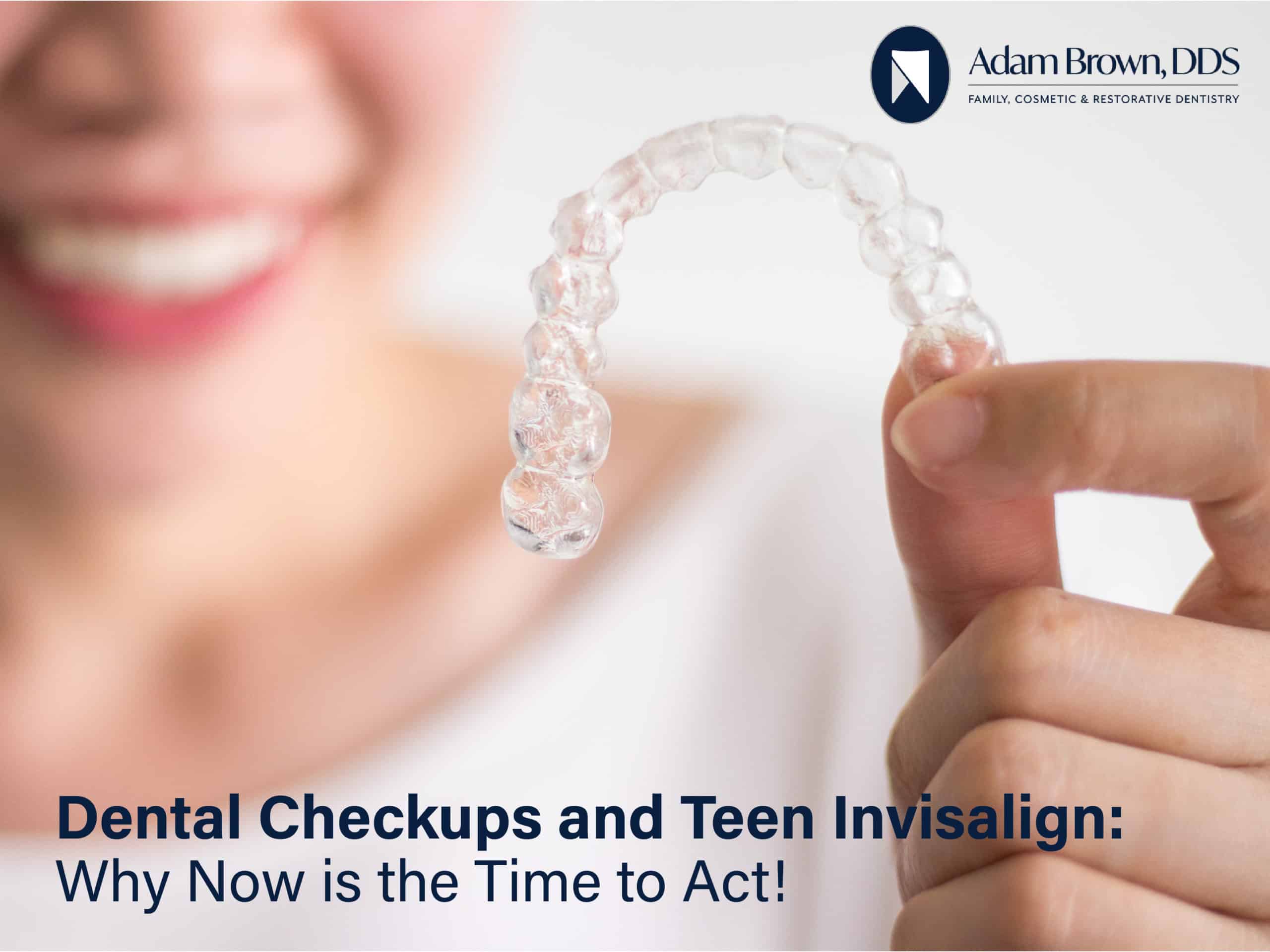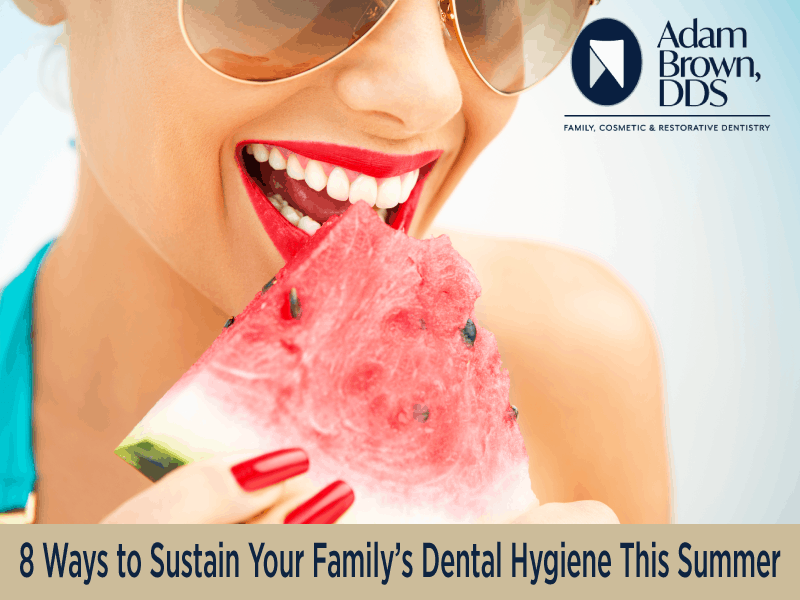Dental Checkups and Teen Invisalign: Why Now is the Time to Act!

Our kids have been out of school long enough. After more than a year of shut-downs, unpredictable schedules, and online courses, it’s time to get them back into the flow of education. And you want to make sure your child doesn’t miss a thing during this upcoming school year!
That’s why now is the time to schedule their dental checkup. And if you have a teen who needs some general alignment treatment, this could also be the perfect opportunity to explore Invisalign.
We know—you already have a lot on your plate. To ease your load a little, we’ve provided some practical information and answers to common questions about back-to-school dental checkups and Invisalign:
Top Reasons for Scheduling Now
Why is it a good idea to schedule your child’s dental appointment now instead of, say, a few months down the road? There are many reasons. Here are just a few of them:
Flexibility of Schedule
As soon as your child begins the school year, you’re going to have tons to do and limited time to do it. Carpools, homework, extracurricular activities, and other commitments that come with the school year can fill your schedule up and seriously raise your stress levels. Add another appointment to your to-do list, and it can become downright overwhelming. Typically, the summertime is more relaxed both for families and dentists. By scheduling a checkup now, you can bypass the stress.
Catching Problems Early
The sooner you identify potential dental issues, the better. Bringing your child to the dentist every six months for a cleaning is critical for their dental health. But the examination part of a checkup is just as important.
During an appointment, your child’s dentist will conduct a thorough evaluation of their dental health. This includes looking for chips, cracks, and early signs of cavities, tooth decay, and other problems. A routine visit can save your child from painful dental procedures as well as prevent you from getting hit with an expensive medical bill.
Better Concentration
For many kids, staying focused through class and homework assignments is hard enough. But if your child has a dental issue, it can throw their concentration off even more. Think about it—would you be able to stay focused on the task at hand if you had a throbbing toothache or a relentless sharp pain in your mouth? By getting your child checked out over the summer, it will help them concentrate and lower the risk of them having to miss class for an emergency dental appointment.
Oral Health Maintenance
Every aspect of a dental checkup is meant to promote your child’s overall oral health. Thorough cleaning and fluoride treatment can do wonders for preventing cavities, decay, and other serious issues. If your dentist thinks it is necessary, sealant treatment can provide additional protection.
But there’s another factor to consider: A lot of parents find it challenging to get their children to maintain oral hygiene at home. And your child’s dentist can provide them with compelling information that stresses the importance of oral hygiene. Moreover, the dentist can give you and your child personalized tips for brushing, flossing, and other hygienic practices.
Questions to Ask the Dentist
OK, so you’ve been convinced to schedule your child’s dental checkup sooner than later. That’s good. Now, you just have to prepare to get the most out of your visit. Here are a few questions to ask your child’s dentist during the appointment:
Will there be a cleaning today?
Cleaning is to be expected during any checkup. But just to be safe, confirm with your child’s dentist that there will be a cleaning. This is critical. No matter how well or often your child brushes, it’s not possible for them to remove all of the cavity-causing bacteria from their mouth. Getting a professional cleaning is one of the most fundamental steps they can take toward good oral health.
Does my child need sealants?
Fabricated from plastic or other dental materials, sealants are thin, protective coatings that can be placed on your child’s permanent back teeth. While these are no substitute for hygienic practices like brushing and flossing, they can go a long way in preventing bacteria and food particles from settling into the nooks and crannies of your child’s teeth. Sealants are particularly effective at preventing cavities and stopping the progression of existing spots of tooth decay.
It’s best practice to apply sealants as soon as possible after your child’s permanent molars come in. But they can still help teenagers and even adults. Since sealants reduce the risk of cavities by 80%, it’s definitely something worth asking the dentist about.
Does my child need an x-ray?
Your child won’t need to get an x-ray at every checkup. Still yet, it won’t hurt to ask the dentist about it each time. X-rays help your child’s dentist see the big picture of how your child’s teeth are developing, and they provide a clear picture of root health. Furthermore, x-rays can reveal tooth decay that may otherwise go unnoticed.
Will you assess my child’s mouthguard?
If your child wears a mouthguard for sports, you will want to bring the mouthguard in at each checkup. Your child’s dentist can assess the wear and tear of the mouthguard, as well as how well it fits in your child’s mouth. This is especially critical if your child is going through a growth spurt or getting new teeth; in these cases, you may need to get the mouthguard reformed.
Do you have any general suggestions for improvements?
The primary focus of a dental checkup is to look at overall dental health. The dentist will take an in-depth assessment of your child’s teeth and gums to ensure that the teeth are lining up correctly, that the bite is in good shape, and that no serious issues are on the horizon. If you have any concerns about your child’s dental health routine at home, be sure to ask for suggestions from the dentist as to how you can help improve it.
Is It Time for Your Teen to Start Invisalign?
Life is difficult enough for teenagers. Attaching a bunch of metal brackets to their teeth is sort of like adding insult to injury! Thankfully, braces are no longer the most popular or effective solution for correcting a teenager’s misaligned teeth or bad bite. Invisalign aligners have made many strides over the years and are now the go-to treatment for common alignment problems. Don’t know much about this product? Read on to get the gist!
What Exactly is Invisalign?
Invisalign is a brand of aligners that gradually move your teeth into their correct places. Much like braces, these aligners apply pressure on designated areas. However, unlike braces, Invisalign aligners are completely clear, and they are also removable (like retainers).
When you order Invisalign, the dentist will send measurements and molds of your teen’s mouth to a lab that will custom-fabricate a tray of aligners to fit their teeth perfectly. This process will occur several times, and each tray of aligners will be manufactured slightly straighter than the one before it.
As with other orthodontic devices and procedures, the Invisalign process is an investment. As such, it’s not something to be done via trial and error. At Adam Brown DDS, we will conduct a thorough consultation with your teen to ensure that they are a good candidate for clear aligners.
The Benefits
If your teen has misalignment issues in their teeth, jaw, or both, correcting those issues with Invisalign could yield a plethora of benefits. Here are a few key benefits to keep in mind:
• Self-Confidence
Your teen’s self-confidence will remain intact when using Invisalign. It’s truly a win-win situation; they get all the benefits of wearing traditional braces, but rather than chunks of metal, their clear aligners are essentially invisible! What’s more, as your teen’s teeth and bite are corrected, their self-confidence will likely increase.
• Comfort
Cuts and irritation in the mouth are common with braces. These issues don’t occur as often with Invisalign. If your teen experiences sharp edges and corners while wearing the aligners, the dentist can shave them down. Plus, your teen’s aligners will be custom-trimmed to fit their gum line, which will reduce the risk of irritation and discomfort. The comfort of Invisalign aligners can help your teen stay focused and succeed in school, work, and extracurricular activities.
• Few Dietary Changes
Anyone who has ever had braces can attest to the dietary restrictions involved. There are countless foods, snacks, and beverages that can cause damage to traditional braces. With Invisalign, there’s really no limit to what you can eat and drink. That said, it’s critical that your teeth and gums are kept clean; otherwise, the aligners themselves will not be clean.
There is one caveat, however. Your teen should never eat or drink anything (besides water) without first removing their aligners. Once they are finished eating or drinking, they will need to put their aligners back in. If you want to ensure the healthiest process possible, encourage your teen to brush their teeth before reinserting the aligners.
Common Questions About Invisalign
Finally, most parents have their fair share of questions concerning Invisalign. To help you get a better idea of whether or not clear aligners are the right solution for your teen, consider the answers to these common questions:
Why not traditional braces?
If your teen wears the aligners as their trained dentist recommends, Invisalign Teen can be every bit as effective as traditional braces for correcting common alignment issues. There are many problems and obstacles associated with the metal brackets and wires of braces. Invisalign aligners are easily removable, which means that your teen can play sports and engage in other activities without having to worry about damaging their braces or mouth.
How can I ensure my teen wears the aligners?
Parents of even the most responsible teenagers may be concerned about a lack of structure and routine. After all, you don’t want to make a significant investment if you’re not confident that your teen will wear their aligners as recommended (22 hours a day is standard).
Fortunately, Invisalign aligners have a unique feature called “compliance indicators,” which are essentially blue dots that disappear when your teen is wearing the aligners according to their treatment recommendations. If the blue dots are present at your teen’s next checkup, it will notify you and the dentist that your teen hasn’t been wearing the aligners appropriately.
What if an aligner gets lost?
Teenagers (and adults, for that matter) lose things. If your teen loses their aligners, no problem! Invisalign will provide up to six free replacement aligners. All you have to do is notify your dentist so the new aligners can be ordered.
Conclusion
Just because the world stopped for the pandemic doesn’t mean that your child’s dental health should slide! Reduce your stress and gain peace of mind by scheduling your child a checkup at Adam Brown DDS this summer. That way, you will know that you are fostering their health without having to take them out of school. And if you’re interested in starting Invisalign treatment for your teen, be sure to ask our office about that as well!

